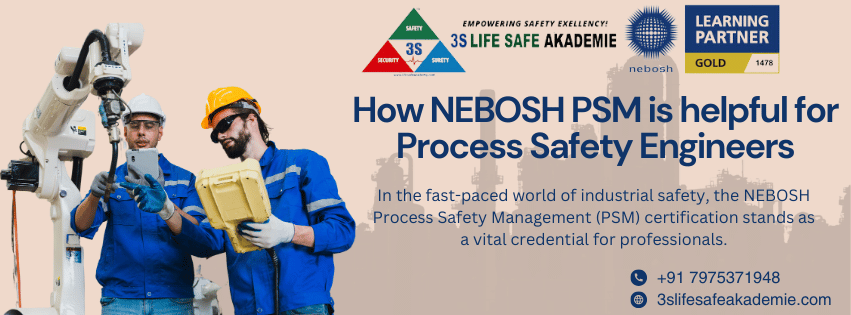
Posted by:- Sushant Mishra
06-07-2024
In the fast-paced world of industrial safety, the NEBOSH Process Safety Management (PSM) certification stands as a vital credential for professionals. NEBOSH, the National Examination Board in Occupational Safety and Health, is a globally recognized organization providing comprehensive safety training. For process safety engineers, this certification is crucial as it equips them with the knowledge and skills necessary to manage process risks and ensure safety in various industrial settings.
NEBOSH PSM stands for the NEBOSH Process Safety Management certificate. It is a specialized qualification designed for individuals working in process industries such as oil and gas, chemicals, and pharmaceuticals. The course focuses on the principles of managing process safety, covering topics like process hazard analysis, risk management, and incident investigation. It aims to equip professionals with the knowledge and skills to identify, evaluate, and control process safety risks effectively.
The NEBOSH PSM syllabus is carefully designed to cover critical aspects of process safety. It includes four core modules:
These modules encompass a range of topics, including hazard identification, risk assessment, safety management systems, and emergency planning. The syllabus aims to provide all-inclusive understanding of process safety, ensuring that engineers can apply their knowledge effectively in real-world scenarios.
The NEBOSH PSM course offers flexible learning options to accommodate different schedules. Typically, the course requires a minimum of 28 tutorial hours and approximately 20 hours of private study for an overall total of 48 hours. Classes are available on weekdays, weekends, and evenings, making it convenient for working professionals. Additionally, the course can be pursued online or in-person, providing further flexibility.
Evening sessions offer numerous benefits for working professionals, allowing them to study after work hours, making it easier to balance their educational pursuits with their professional responsibilities. These sessions typically feature shorter classes spread over more weeks, providing a manageable structure that accommodates the busy schedules of working individuals. By effectively managing their time, professionals can balance their evening classes with work and personal life, ensuring they can meet their educational goals without compromising other commitments.
The NEBOSH PSM exam is structured to evaluate both theoretical knowledge and practical skills. It includes multiple-choice questions, scenario-based questions, and practical assessments. This comprehensive approach ensures that candidates are well-prepared to handle the complexities of process safety management in their professional roles.
Process safety engineers play a crucial role in ensuring the safety and efficiency of industrial processes. Their key responsibilities include:
These professionals are essential in industries such as oil and gas, chemical manufacturing, pharmaceuticals, and food processing, where safety is paramount.
The NEBOSH PSM certification is highly relevant for process safety engineers as it helps them develop critical skills and enhance their knowledge. By completing this certification, engineers gain a deep understanding of industry best practices, regulatory requirements, and the latest safety technologies. This knowledge is essential for ensuring compliance with industry standards and maintaining a safe working environment.
Upon completing the NEBOSH PSM course, participants will have gained:
Process safety engineers are vital in several industries, including:
Career progression for process safety engineers can follow various pathways:
In summary, the NEBOSH PSM certification is an invaluable asset for process safety engineers. It provides comprehensive training in hazard identification, risk assessment, and safety management systems, equipping professionals with the skills and knowledge needed to excel in their roles. With flexible learning options and a robust exam structure, NEBOSH PSM ensures that engineers are well-prepared to meet the challenges of process safety management in various industries.